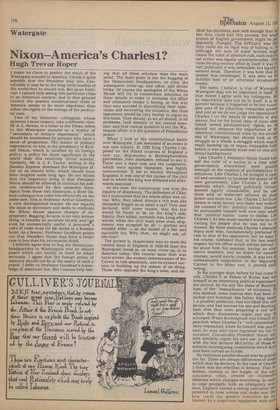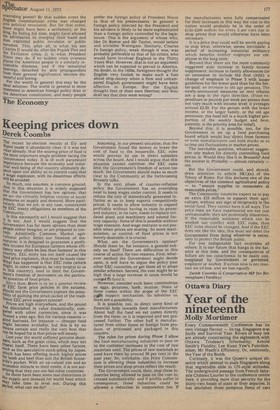Watergate
Nixon—America's Charles1?
Hugh Trevor Roper
I make no claim to predict the result of the Watergate scandal in America. I think it quite possible that the President may win..Conceivably it may be in the long-term interest of the world that he should win. But as an historian I cannot help seeing this particular crisis in an historical context; and in that general context the present constitutional crisis in America seems to be more important than either the rights or the wrongs of the particular case.
Two of my historical colleagues, whose opinions I must respect, take a different view. Dr A. L. Rowse, in a letter to the Times, refers to the Watergate scandal as a matter of "secondary or tertiary importance" which should be overlooked by persons who have a sense of proportion. The matter of primary importance, to him, is the presidency of Richard Nixon, which is justified by its foreign policy: a policy far more significant to the world than this relatively trivial scandal. Similarly, Mr A.J. P. Taylor, writing in the Sunday Express, dismisses the Watergate affair as an absurd trifle, which should have been laughed aside long ago. He too thinks that the important thing is that President Nixon should be allowed to continue his policies undistracted by this unseemly farce. Apart from these two historians, a third Oxford colleague has come out effectively on the same side. This is Professor Arthur Goodhart, a very distinguished lawyer. He too regards the issue as secondary and seeks to vindicate the White House against charges of impropriety. Bugging, he says, is no very serious thing: it ensures an accurate record, and cin even be unexpectedly useful: it procured a cake of toilet soap for Mr Attlee in a Russian hotel. As a tawyer, Professor Goodhart points out that President Nixon may have a better case in law than his adversaries think.
I entirely agree that to bug the Democratic headquarters in Washington was an absurd prank which can hardly, in itself, be taken seriously. I agree that the foreign policy of America should not be at the mercy of such a prank. I defer to Professor Goodhart's knowledge of American law. But I cannot help feel
ing that all these scholars miss the main point. The main point is not the bugging of the Democratic headquarters, or even the subsequent cover-up, and other, still dirtier tricks. Of course the apologists of the White House will try to concentrate attention on these details in order to trivialise the affair and ultimately render it boring. In this way they may succeed in discrediting their opponents and recovering the initiative. But their opponents would be very foolish to argue on this basis. They should, as we all should, in all problems, look steadily at the central question; and that central question is not the Watergate affair: it is the question of Presidential power.
When I look at the constitutional battle over Watergate. I am reminded of an event in our own history. In 1635 King Charles I imposed on the inland counties of England a new tax, ship-money. A Buckinghamshire gentleman, John Hampden, refused to pay it. There was a legal case and the judgement, which went against Hampden, was highly controversial. It led to mutiny throughout England. It was one of the causes of the civil war in which the king was defeated and afterwards executed.
At the time, the controversy was over the legality of shipmoney. The defenders of Charles I maintained that the whole affair was trivial. Why, they asked, should a rich man like Hampden boggle at so small a tax? They also declared, with some reason, that the law would be found to be on the king's side. Equity, they added, certainly was. Long afterwards, when the civil wars were over, shipmoney was accepted by all — puritan and royalist alike — as the model of a fair and equitable tax. Why then, we might ask, all the fuss?
The answer is, ship-money was no more the central issue in England in 1635-40 than the Watergate break-in, or even cover-up, is in America today. The central issue then was royal power: the evident determination of the Crown to rule absolutely, and its evident success in building up the means of so doing. Those who opposed the king's aims, and dis
liked his ministers, saw well enough that ue less they could halt this process, the whole system of English government might be pet manently changed. The difficulty was tho' they could see no legal way of halting it; ter although the sum of royal actions might create the habit of absolute rule, each indivie ual action was legally unexceptionable. The came the ship-tmoney affair.In itself it was vial; politically it was defensible; but legally seemed weak. Therefore it was here that thi system was challenged. It was seen as tlu Achilles heel of an otherwise invulnerable enemy.
The same, I believe, is true of Watergate Watergate may not be important in itself. tre that extent I agree with my colleagues. But its importance does not lie in itself. It is int* portant because it happened to be the \ruiner able area of an otherwise irresistible systeel And just as we do not judge the opposition le Charles I on the merits or demerits of shiP money, but on the broad issue of royal absa lutism versus parliamentary rights, so 0 should not measure the importance of the American constitutional crisis by the triviali. ties of Watergate, but should look at the struggle as a whole: a struggle which was al' ready looming up, in vague, intangible fora( before it was suddenly made real on this acci. dental battleground.
Like Charles I, President Nixon found hint self the ruler of a nation at a time whee governments everywhere were strength at the expense of parliamentary le stitutions, Like Charles I, he thought it flan)" ral and necessary to increase the power of own government. Like Charles I, he use' methods which, though politically
seemed legally unassailable; and he use( them with an indiscreet reliance on sheer power and mere law. Like Charles I, he fowl° means to raise money and make war without the 'consent of the 'political nation.' Instead he surrounded himself with new men whoa' that 'political nation ' came to dislike. LW Charles I, he also made matters worse by coa vincing his people that he was not to be trusted. By these methods Charles I alienated many men who, fundamentally preferred ht5 rule to that of his opponents; but he kept at! his course, confident that, in the last resort,: respect for his office would always prevail:11 he stood firm, his enemies, having no alter native tradition, and no desire for extrente courses, would surely crumble. It was not et unreasonable supposition in the beginning Carried to the bitter end, it proved sad') wrong. In his younger days, before he had come te rule, Charles I, as Prince of Wales, had lent, himself to an interesting political experimentl the revival, by his ally the Duke of Bucking'. ham, of the ' impeachment ' of ministers. BY this method, some famous men had been at. tacked and humbled. His father, King Jame I, a prudent politician, had not liked this no) device, and had warned his son and Bucking ham that they were preparing a rod witt which they themselves might one day be scourged. When Buckingham was himself peached, when Charles l's "evil counsellors were impeached, when he himself was put Oil trial, he may well have regretted his old at novation. Conceivably President Nixon ma) now similarly regret his own use, in alliance with the late Senator McCarthy, of those se natorial investigating committees which have now been turned on to him.
No historical parallel should ever be pushel too far. There are always differences of detat
which may be decisive. In the case of Charlee I there was the rebellion in Ireland. That re'
bellion, coming at the height of the
stitutional crisis, created an intolerable dilemma which changed everything. In order to cope promptly with an emergency over seas, England needed a strong executive, el'a: powered to raise armies and make war. OLP
how could the present executive be eu," trusted, by a suspicious legislature, with say
overriding power? By that sudden event the English constitutional crisis was changed into political revolution. But for that event, there might have been a settlement; or the king, by biding his time, might have allowed his adversaries to overplay their hand and then exploited public revulsion or public boredom. This, after all, is what his son Charles II would do, after the Popish Plot and the Exclusion crisis. It is what President Nixon may do, if no sudden crisis overseas Places the American people in a similarly intolerable dilemma, and if the senatorial hearings, detached by able propagandists from their general significance, become distasteful and boring. , For the world in general this may be the ideal solution. The world in general is more Interested in American foreign policy than in the American constitution, and many people prefer the foreign policy of President Nixon to that of his predecessors. In general a foreign policy directed by the President and his advisers is likely to be more sophisticated than a foreign policy controlled by the legislature. This is the argument of whose who, like Dr Rowse and Mr Taylor, would isolate and trivialise Watergate. Similarly, Charles I's foreign policy, weak though it was, was probably preferable to that of his critics, who would have involved England in the Thirty Years War. However, that is not an argument which can be expected to prevail in America. No doubt, in the 1630s, foreigners thought the English very foolish to make such a fuss about ship-money when a firm and unhampered English government might have been effective in Europe. But the English thought first of their own liberties; ana wnu shall say that they were wrong?



































 Previous page
Previous page